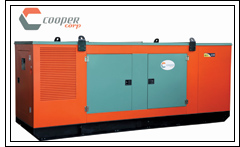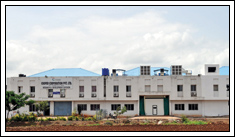 —Farrokh N. Cooper, Chairman & Managing Director, Cooper Corporation Pvt. Ltd.
—Farrokh N. Cooper, Chairman & Managing Director, Cooper Corporation Pvt. Ltd.
Cooper Corporation recently launched
“Cooper ECOPACK,” a three-cylinder diesel generator currently available in 62.5 KVA and 82.5 KVA ratings.
Farrokh N. Cooper discusses the new product and explains how it scores on various efficiency parameters. Given that diesel subsidy will be eventually phased out, the running costs of gensets are bound to shoot up. In such a scenario, highly efficient gensets like the ECOPACK can provide a viable solution, says Cooper.
Tell us in brief about the salient features of the new Cooper ECOPACK series.The salient features are small size, light weight, quieter operations, low fuel consumption and maintenance cost, low output voltage fluctuation and CPCB-II compliance.
Are there plans of extending the series to higher KVAs?The Cooper range of gensets is currently from 10 KVA to 180 KVA, powered by the Cooper family of engines in 2, 3, 4 and 6 cylinders. These engines are designed in technical collaboration with Ricardo of UK, a global leader in engine design. We at Cooper are also looking to enhance our range shortly to move up to 1 mw (1,000 KVA).
Would you regard the ECOPACK as the most efficient diesel genset in its class?
ECOPACK’s distinction comes from several outstanding features and benefits like 25 per cent lower fuel consumption, 25 per cent smaller size, 40 per cent lighter in weight, 42 per cent saving in maintenance cost and several times quieter.
 Tell us about Cooper’s collaboration with Ricardo of UK. It is limited to the ECOPACK series?
Tell us about Cooper’s collaboration with Ricardo of UK. It is limited to the ECOPACK series?
Ricardo UK has provided the design for the Cooper family of engines, which are best suited for Indian conditions, with the best fuel efficiencies, lowest maintenance costs and lowest emissions.
How has been the customer response to ECOPACK so far? Who do you perceive as your biggest consumers for ECOPACK? In terms of the domestic market, which regions hold high potential?
Our customers profile are across several segments, most popular being banks and financial institutions, fuel retailers, hotels, hospitals and clinics, office complexes and retail stores. In the domestic market, the Cooper ECOPACK could be a choice for homes, farm houses, bungalows and hotels due to its compact size, low noise and best of class fuel efficiency.
Given its portability and efficiency, do you see a strong case for exports of ECOPACK?
Our exports are growing month on month and our network has now spread across Africa and Middle East, as well as neighboring countries of Sri Lanka, Nepal and Bangladesh. We are successfully selling our gensets in markets previously dominated by European brands. The performance delivery has been well appreciated in countries such as Nigeria, Kenya and Tanzania.
Phasing out of diesel subsidy will undoubtedly affect the economics of genset-based power generation. Do you think that there is further scope to improve fuel efficiency of diesel gensets?
The Cooper Engines offer up to 30 per cent fuel benefits over competition already. Moreover, our engines are designed for compliance with Euro IV emission norms and the gensets are already complaint with Indian future norms of CPCB II. We are looking forward to removal of subsidy as this will give further impetus to increase Cooper’s market share.
 Given the imminent high cost of generation in view of removal of diesel subsidy, do you feel that high-rating inverters could replace diesel gensets, especially the low-KVA ones?
Given the imminent high cost of generation in view of removal of diesel subsidy, do you feel that high-rating inverters could replace diesel gensets, especially the low-KVA ones?
In the sub 10-KVA range and based on applications, diesel gensets will always take precedence. In the higher power ratings, gensets will keep its own stead. In the case of inverters, one must also appreciate that consumables costs and maintenance costs of batteries etc cost are increasing by the day.
What is your view on the role of renewable energy sources in temporary power and power backup devices?
Renewable energy definitely has a role to play however the present capex costs per Kw are prohibitive. Such alternative power solutions will serve only for standby applications. However, in most parts we need prime power backups which today are effectively met by gensets.
The deficient power situation in Maharashtra where Cooper has had a longstanding presence has often come under severe criticism. What is your overall view?
The deficient power situation benefits us at Cooper and we are increasing our population as well as our network across the state. Power supply remains erratic and people have to depend upon alternative back up power to drive industry.